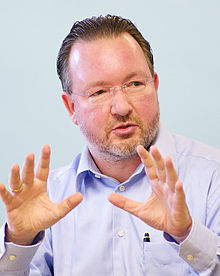Rudiger Frank
Rüdiger Frank (* 1969 in Leipzig ) is a German economist and East Asian scientist who focuses on North Korea .
Life
Frank grew up in the GDR . At the age of 5 he and his family moved to the Soviet Union for 4 years , where his father worked as a nuclear physicist in an international research center.
In 1991/1992 Frank spent one semester language studies financed by the German Academic Exchange Service at Kim Il-sung University in Pyongyang, North Korea . At the Humboldt University in Berlin he studied Korean studies with mentor Helga Picht , as well as economics and international relations . In 1996 he was there with a thesis on the support of DDR in rebuilding the North Korean city of Hamhung for Dr. rer. oec. PhD. He submitted his habilitation thesis in 2003 on the subject of deregulation of the telecommunications market in South Korea at the Gerhard Mercator University in Duisburg .
Frank later taught at Columbia University's School of International and Public Affairs in New York . In 2007 he was appointed professor for "East Asian Economy and Society" at the University of Vienna . Since 2012 he has also been director of the Institute for East Asian Studies in Vienna. As an adjunct professor Frank is at the South Korean Korea University and at the University of North Korean Studies (Kyungnam University) in Seoul operates. He visits both Korean countries regularly and was a member of EU delegations.
Create
Frank is one of the few North Korea experts who have lived in socialist systems with German, Soviet and North Korean characteristics. He uses his background in economics, Korean studies and international relations to analyze and comment on a range of economic and security policy topics in the East Asian region and especially in North Korea from different perspectives.
Frank's research focuses on the transformation of socialist systems in East Asia and Europe (with a focus on North Korea), the relationships and interdependencies between state and companies in East Asia, and the analysis of regional integration in East Asia. In addition to his academic work, Frank is active in political consulting: Among other things, he advised a group of former heads of state “ The Elders ” around Jimmy Carter and is a member of the World Economic Forum . In September 2013, the Frankfurter Allgemeine Zeitung named him one of the most influential economists in Germany.
Academic positions
- Council Member, Association for Korean Studies in Europe
- Board member, Austrian Association of University Professors
- Co-editor of the European Journal of East Asian Studies
- Co-editor of the book series "Korea: Politics, Economy, Society"
- Member of the Board of Editors, Brill's Korean Studies Library
- Member of the scientific advisory board for Korea and Japan, German Society for Asian Studies
- Associate, The Asia Pacific Journal aka Japan Focus
Works (selection)
- The GDR and North Korea. The reconstruction of the city of Hamhùng from 1954–1962 . Shaker Verlag , Aachen 1996, ISBN 3-8265-5472-8 .
- with Patrick Köllner: Politics and Economy in South Korea . Institute for Asian Studies, Hamburg 1999, ISBN 3-88910-215-8 .
- EU-North Korean Relations. No Effort Without Reason . In: International Journal of Korean Unification Studies . tape 11/2 . Korea Institute of National Unification, Seoul 2002, p. 87-119 .
- North Korea: Between stagnation and pressure to change . In: Introduction to the Political Systems of East Asia . Verlag für Sozialwissenschaften, Wiesbaden 2003, ISBN 3-322-86664-5 , p. 271-325 .
- Regulation in the Republic of Korea . Characteristics and reforms using the example of the telecommunications sector. Peter Lang, Frankfurt am Main 2003, ISBN 3-631-51038-1 .
- Can Economic Theory Demystify North Korea? In: Korea Review of International Studies . Vol. 9, No. 1 . Global Research Institute, Korea University, Seoul 2003.
- Failure or Success of a Hybrid System? In: Nautilus Institute Policy Forum Online . February 10, 2005.
- Economic Reforms in North Korea (1998–2004): Systemic Restrictions, Quantitative Analysis, Ideological Background . In: Journal of the Asia Pacific Economy . Vol. 10, No. 3 . Routledge, August 2005, pp. 278-311 .
- Classical Socialism in North Korea and its Transformation: The Role and the Future of Agriculture . In: Harvard Asia Quarterly . Vol. X, No. 2 , 2006 ( asiaquarterly.com [accessed January 21, 2015]).
- Lessons from the Past: The First Wave of Developmental Assistance to North Korea and the German Reconstruction of Hamhùng . In: Pacific Focus . Vol. XXIII, No. 1 , April 2008, p. 46-74 .
- Analyzing North Korea: Big Wheel Turning . In: The World Today . Vol. 7. Chatham House, London 2008, pp. 28-29 .
- Ideological Risk versus Economic Necessity: The Future of Reform in North Korea . In: The Asia-Pacific Journal . corrected and enlarged edition. Vol. 30, No. 4 , July 27, 2009.
- Money in Socialist Economies: The Case of North Korea . In: The Asia-Pacific Journal . February 22, 2010.
- with Jim Hoare, Patrick Köllner and Susan Pares: Korea 2012. Politics, Economy and Society . Brill, 2012.
- North Korea: Inside views of a total state . Deutsche Verlags-Anstalt, Munich 2014, ISBN 978-3-421-04641-3 .
- Out and about in North Korea: A tightrope walk . Deutsche Verlags-Anstalt, Munich 2018, ISBN 978-3-421-04761-8 .
Web links
- Literature by and about Rüdiger Frank in the catalog of the German National Library
- resume
- Overview of Rüdiger Frank's publications on Academia
Individual evidence
- ↑ Martin Hyun: Speculations without gaining knowledge. In: Deutschlandradio Kultur. October 25, 2014, accessed January 12, 2015 .
- ↑ The most influential economists in the overall ranking. In: Frankfurter Allgemeine Zeitung. September 5, 2013, accessed January 12, 2015 .
| personal data | |
|---|---|
| SURNAME | Frank, Rudiger |
| BRIEF DESCRIPTION | German economist and East Asian scholar |
| DATE OF BIRTH | 1969 |
| PLACE OF BIRTH | Leipzig |
